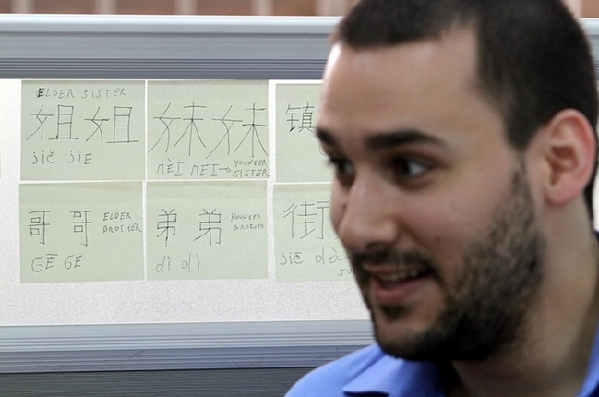Local gov't hires int'l employees
- By Chen Boyuan
 0 Comment(s)
0 Comment(s) Print
Print E-mail China.org.cn, August 6, 2014
E-mail China.org.cn, August 6, 2014
|
|
|
Chris Blake from Britain. [File photo] |
Four expats have joined the payroll of a government agency in Foshan City, Guangdong Province, bringing a fresh outlook and greater efficiency to the traditional government workplace.
Nicolas Santo from Uruguay and Chris Blake from Britain have been working at the Foshan Investment Promotion Bureau for seven months.
Placed in the post of "International Investment Promotion Specialist," these expats are mainly required to gather information related to foreign investment and contact senior management at Fortune 500 companies, which will ideally attract more investment capital to Foshan. Santo and Blake are also responsible for the launch of the English edition of the bureau's website.
These internationals' language capabilities and superior communication skills are what qualified them for the job, said Yu Hongping, the deputy director of the bureau.
In addition to his native Spanish, Santo is also fluent in English, Portuguese and Italian, and he also speaks a little Chinese -- an advantage in the frequent dealings with international businesspersons that his job requires.
"They are good at communication. They are more familiar with international websites, and can find useful information more easily. Apart from that, they have a remarkable advantage in communicating with foreigners," Yu said.
Expats working in China are exempted from central administrative approval for international business travel, which happens a lot when seeking international investments.
Yu noted that he was impressed that many foreigners held a positive view of China's future, evident in the fierce level of competition for the four job openings. He added that the addition of expats to the staff shows that the sub-national government in China is becoming more open.
|
|
|
Nicolas Santo from Uruguay. [File photo] |
Santo said that the affluent investment climate and other business opportunities in Foshan led him to decline another job opportunity in Washington, D.C.
Currently, the four expats have year-long contracts which afford them a salary and benefits similar to those of a section-level chief. They enjoy the same standard social security and medical care as Chinese staff members, but they are not given a special housing fund, because normally expats do not plan on buying a house in China. "They all rent houses for now, and we provide house rental allowances," Yu said.
Santo has an American girlfriend working as a lawyer in Hong Kong. The two plan to stay in Asia for another four to five years, but they find the situation beyond that difficult to predict.
Though they have been on board for only several months, Santo and Blake have exhibited how different their working style is from that of their Chinese colleagues.
Yu said that they almost never settle business at banquets, which is characteristic of the Chinese working style. Instead, they send emails to make appointments before heading to the meetings alone. "They make achievements based on soft power and communication," said Yu.
Despite their excellent performance, there do not seem to be any opportunities for career advancement for these expats, because "their posts are fixed, as stipulated in their contracts," said Yu, who admits that things are yet to be perfected in this pilot program.








Go to Forum >>0 Comment(s)